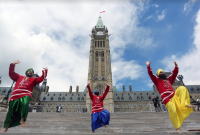Support strong Canadian climate journalism for 2025
Celebrations across Canada this weekend may look different from one community to the next, but for most of the country it will all sound the same.
Derek Denis, a post−doctoral researcher of linguistics at the University of Victoria, said more than just the stereotypical "eh?" unites Canadians.
His research comparing the recorded oral histories from 50 years ago and interviews from more recent times found that from the Ontario−Quebec border to Vancouver Island, English−speaking Canadians have a largely homogenous accent.
"There is almost no dialect region that is that large and so homogenous," Denis said.
The United States and even the United Kingdom have far more variation over smaller geographic areas. Denis said migration patterns and settlement patterns are believed to be behind the consistency in accent in Canada.
Southern Ontario was settled by English−speaking United Empire Loyalists who were fleeing the American Revolution in the late 1700s. Denis said those people established their accent and as they drove the westward colonization, the accent spread across the country.
It’s a phenomenon Matt Hunt Gardner, Canadian English instructor and PhD candidate at the University of Toronto, said is called the "founder effect."
"Who the first successful or persistent group of English speakers is in an area is important because they sort of set the tone for everybody who comes later," he said.
That means if a swell of immigrants enter a community, they and their children will eventually adopt the accent of the original settlers.
Loyalists who fled to the Atlantic provinces were largely from the coast, unlike those from inland who went to Ontario. A significant number of Scottish settlers also influenced language in Cape Breton and Prince Edward Island, Gardner said.
The distinct Newfoundland accent is a result of settlers from southwest England and southeast Ireland, Gardner said. Because Newfoundland was last to join the Confederation and remained relatively isolated, its unique accent was preserved.
Yet while many Canadians say they can tell whether someone is from the East or West based on their accent, the differences are narrowing, Gardner said.
Atlantic residents are increasingly dropping their distinct Rs and the use of "dis and dat" for "this and that" to sound more like Canadians in Ontario, which Gardner said is largely driven by economic factors.
People want to be mobile and work outside the region, and Gardner said sounding more like the rest of the country is perceived as desirable.
As for Canadians’ use of the linguistic feature "eh," Denis said it doesn’t define the country in the way most people think. He said it isn’t used nearly as often as other linguistic features, such as "right?" and "you know?"
Eh isn’t unique to Canadian English either. Denis said the first use in English literature was found in an Irish play from the 1770s and didn’t appear in Canadian literature until the 1830s.
What is unique, Denis said, is its status in Canada, which started to develop in the 1950s and ’60s as the country started to think more about its identity.
The 1980s SCTV skit "The Great White North" helped define the Americans’ perceptions of Canadians as their plaid wearing, eh−saying neighbours. The joke was turned around, Denis said, as Canadians began appropriating the word.
"I think most Canadians agree that part of the Canadian identity is to be explicitly not American, so if you have Americans laughing at you for using eh for being Canadian, that might be something you want to embrace because it defines you as not American," he said.
While a single television show was enough to differentiate Canadians from their southern neighbours, there’s no cause for alarm about an overwhelming amount of American content broadcast in Canada undoing our unique accent.
Television and other media are great tools to spread or popularize certain words or phrases, but Gardner said "when it comes to how you construct a sentence or pronounce something, that’s something that requires face to face contact."
American television has been playing in Canada for 70 years now and the differences between Canadian English and American English are growing, not shrinking, Gardner said.





Comments